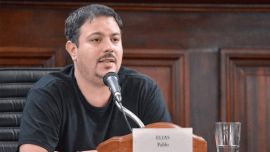It is striking that President Alberto Fernández's alleged WhatsApp chat with journalist Roberto Navarro has not resulted in a real political scandal.
In a message (weakly denied by Casa Rosada) he allegedly said, more or less, that he is willing to face Chaco Province Governor Jorge Capitanich in the ruling coalition’s presidential primary primaries and that, in the event of him winning, he would be the one to bury "20 years of Kirchnerism." It was a message that he made sure would reach its recipients.
There is a consensus among influential writers such as Pierre Bourdieu, Jacques Rancière and Ernesto Laclau that politics is mainly confrontation, to show disagreements, to generate permanent polarisation. Consensus is a dead letter in political struggle. But the case of Alberto Fernández will set new records in another way, which is the distrust of those who are supposed to be one's own.
No-one forgets that, at the beginning of 2019, the man who is now president was a political commentator whose sharp criticism of Kirchnerismo and in particular of Cristina Fernández de Kirchner's policies showed him to be a staunch opponent, only to agree on a blurry afternoon in May on an unexpected formula. The terms of the agreement between the two will be known one day, but what is clear is that Alberto’s first Cabinet had no pure Kirchnerites, except for Eduardo ‘Wado’ de Pedro. The main positions were appointed at the behest of the new president, such as Martín Guzmán, Daniel Arroyo, Matías Kulfas, Felipe Solá and Santiago Cafiero (today, only the latter survives in office). As to the theory that Cristina only asked him to solve her judicial problems (which are worsening day-by-day), it is strange that she did not ask for control of the Justice & Human Rights Ministry. Alberto initially appointed his close colleague and friend Marcela Losardo, who today enjoys the benefits of Paris as Argentina's ambassador to UNESCO.
Returning to the (presumably non-existent) chat messages, despite their simplicity, several interesting subplots can be read. The first is that it recalls (as if by accident) that half of the 40 years since the restoration of democracy have been hegemonised by Kirchnerism, displacing other well-trodden theses such as the dominance of neoliberalism in the 1990s or Macrism. In synthesis, it establishes that Kirchnerismo is the real existing conservatism in Argentina and that it embodies the social-democratic centre-left, like Pedro Sánchez in Spain. In the second subplot, it rules out the idea that if he is a candidate and up for re-election, the other candidates must withdraw. The third and most important is that (although Fernández has declared countless times that he would never fight with Cristina) it is clear that the fine print of his declarations does not include the fact that he would not provoke her. In short, and most notably, almost in the manner of a mediaeval knight, he is calling for a head-to-head electoral confrontation with her vice-president.
Cristina is now close to deciding if she will make an amendment to her statement that she will not be on any ballot. She may appear on the list for senators in the Buenos Aires Province. In 2017, a similar move ended in a narrow defeat to Esteban Bullrich. It is true that she had a difficult hand with his Unidad Ciudadana label and lost by some 550,000 votes at a time when Macrismo was shining. The main argument for a Senate seat would be to strengthen the re-election bid of Governor Axel Kicillof in an election that looks very complicated, and at the same time, elegantly distance himself from Alberto’s proclamations.
Beyond these tribulations, does Alberto really believe that he has a chance of winning a head-to-head battle with a candidate supported by Cristina, or better still, with the vice-president herself? Undoubtedly, there must be some analysis, some scenario that has been drawn by the small roundtable of advisors that talks daily with the president, beyond the rest of us mortals. There is one point in Alberto's favour, and that is that he has succeeded in installing the idea little-by-little that Cristina did not help him in his administration, and now he will try to impose the idea that he would be a better ruler without the ghost of his vice-president looming over him.
It is true, as the secretary general of the La Cámpora Kirchnerite organisation Andrés Larroque regularly reminds us, that Fernández is currently polling at five percent in the polls (and in order to obtain the measurements they have to resort to complex scenarios, taking out and putting in alternative candidates), but it can be assumed that if Alberto officially declares himself to be the undertaker of Kirchnerism, he is counting on the support he could receive in the primaries from a good part of the anti-K electorate that is currently debating between whether to support Patricia Bullrich or Horacio Rodríguez Larreta. The antagonistic condition of both Juntos por el Cambio candidates, the infinite internal politicking of Frente de Todos and the eruption of Javier Milei (who could even win in the general elections in provinces governed by Peronism) cast greater uncertainty over the political system.
It must also be said that the context helps Alberto too: the fragmentation of the system could lead to no candidate surpassing 20 points in the primaries. There are even surveys circulating that show that both the president, Sergio Massa and Daniel Scioli would be in a position to capture the entire Kirchnerite vote in the general elections, a situation that would place them in a run-off with an open ending. “Anything can happen" seems to be the general rule that graces Argentina and excites various operators who hope to achieve unexpected goals.
However, if the possibility of an "electoral landslide" exists, it would be, even before the end of Kirchnerism, the end of the PASO primaries since the democratic system is designed for positive votes. The possibility of a completely tactical or "non-positive" vote (to remember the great phrase of Julio César Cleto Cobos) would lead the political leadership to see the primaries as a fatal threat.























Comments